Transport Focus
London Travelwatch
(Correspondence sent by email only)
Dear Transport Focus & London Travelwatch,
RE: Objections to the proposed closure of ticket offices at Northern Trains, Transpennine Express and LNER
I am writing to express my objections to the proposed closure of ticket offices at Northern Trains, Transpennine Express and LNER and have set out below why I believe these ticket office closures must be rejected.
This is an appalling proposal which is causing huge concern to the 240,000 employees across our railway network as well as the millions of passengers who use these services.
Earlier this week I wrote to the Secretary of State for Transport setting out my objections to this plan and I will go into further detail as part of your consultation.
I have already been contacted by a large number of constituents, including railway staff and rail users who solely rely on the services offered at rail ticket offices.
11% of users rely on rail ticket offices and we still see one in nine tickets sold at offices, these are vital for some of the most vulnerable people in our communities, such as the elderly and those with disabilities.
Furthermore, these plans will undoubtedly threaten accessibility, passenger safety especially women’s safety and jobs across our railways. It is quite often the staff who go above and beyond to assist passengers, particularly those who require the most support navigating our railway network.
Closing physical ticket offices will have a detrimental impact on many of my constituents who will suffer as a result of digital exclusion and do not have access to the internet, or the ability to use apps on a mobile phone which sell tickets, which will severely impact their access to public transport.
It is alarming that thousands of railway staff across the country are at risk of losing their jobs should these changes be implemented.
Staff on our railways do a tremendous job in difficult conditions and worked tirelessly during the pandemic.
It is shameful that, as private rail bosses and shareholders extract millions of pounds of dividends, railway workers have had to resort to industrial action as a last resort in a fight for fair pay and conditions.
Our railways are in desperate need of reform and investment – that should come at the expense of those making obscene profits from our railways, not at the expense of staff and passengers.
I urge you to stop this managed decline of our railways and look again at these proposals which have such a negative impact on railway staff, my constituents, and those people who value a reliable public transport network.
I believe these proposals should be scrapped and have set out further reasons below.
Widespread and easy access to the purchase of rail products
I strongly believe that passengers would no longer have widespread and easy access to the purchase of rail products and best value fares if the ticket office closures went ahead.
There are many rail users who solely rely on the services offered at rail ticket offices. One in nine tickets are still sold at a ticket office and these are vital for some of the most vulnerable people in our communities, such as the elderly and those with disabilities.
While the Government says that ‘only’ 12% of tickets are sold at ticket offices, in 2022/23, there were 1.5 billion passenger journeys, which equates to around 180 million journeys being facilitated by ticket offices.
There are a range of products and services available at the ticket office, which are not available from Ticket Vending Machines (TVMs). This includes refunds, season ticket changes, ranger and rover tickets, ferry/bus connections, park and ride, group save, disabled persons discount, season tickets over one month in length, advance fares, rail card purchases, off-peak tickets before 9.30am, changes to ticket classes, seat reservations, cycle reservations, photocards for season tickets, scholar tickets, sleeper bookings and car parking.
Using TVMs is a one-sided process, there is no interaction between customer and retailer like there is in the ticket office. In contrast, ticket office staff can ask customers questions about their journey and requirements to ensure they get the right ticket for their journey and can offer a range of routes and classes.
Many TVMs do not take cash, or permit a part cash, part card payment. Given that people on lower incomes and older and disabled people are more likely to use cash, these groups stand to be disproportionately affected by ticket office closures and may find it difficult to travel as a result.
Unlike ticket office staff, TVMs do not automatically offer passengers the cheapest ticket for their journey, or clearly explain restrictions on certain fares, such as operator-specific tickets. Indeed, there is no requirement in the DfT’s Schedule 17 guidance for TVMs to offer all fares. This risks passengers losing widespread and easy access to a range of products and fares.
Facilities and support for passengers with disabilities/accessibility or other equalities related needs
Ticket office closures would cause a significant worsening of the facilities and support offered to disabled, Deaf and older people. Already, disabled people face numerous barriers in accessing the rail network and are three times less likely to travel by rail than non-disabled people. Twenty-two percent of the population had a disability in 2020/2 and since 2002/3 the number of people reporting a disability has increased by 3.8million (+35%).
I am alarmed that closing physical ticket offices will have a detrimental impact on many of my constituents who will suffer as a result of digital exclusion and do not have access to the internet, or the ability to use apps on a mobile phone which sell tickets, which will severely impact their access to public transport.
I understand that there has been overwhelming opposition to ticket office closures from disabled people’s organisations, including Disability Rights UK, National Federation of the Blind UK, Transport for All, RNIB, RNID, Guide Dogs, Scope, Thomas Pocklington Trust, Winvisble, Greater Manchester Coalition of Disabled People and the MS Society.
It is alarming that thousands of railway staff across the country are at risk of losing their jobs should these changes be implemented. The presence of staff is vital for ensuring the railway is accessible to all. At many stations ticket office staff are the only staff present, and their responsibilities often include assisting passengers on to trains, including with ramps where required and meeting them off the train. TVMs are not accessible for many disabled people, the functionality is poor and there is no interaction, unlike in the ticket office. Disabled people are much less likely than non-disabled people to have access to the internet, and therefore online ticketing is not accessible for many.
Ticket offices provide a fixed location for passengers to locate staff. This is particularly important for many disabled people who would not be able to search a station for a roving member of staff, who may or may not be present at the station. Guide dog users report that their guide dogs are trained to learn the route to the ticket office.
Staff on our railways do a tremendous job in difficult conditions and worked tirelessly during the pandemic. They were promised a high-wage economy by the Government as we came out of the pandemic.
Quality of Service
Ticket offices provide passengers with dedicated advice and expertise about their journey and onward travel. They can tailor their service to meet their customers’ needs in a way that TVMs or online ticketing is unable to. At many stations access to facilities such as toilets, disabled toilets, waiting rooms and lifts is dependent on ticket office staff.
Having ‘roving’ staff, no longer based in the ticket office, not only makes them more difficult to locate, which is particularly problematic for many disabled and older people, but also diminishes their ability to give tailored and one-on-one advice.
Safety at station for passengers
Staffed ticket offices have an important role in supporting passenger safety and security. Ticket offices provide a place of safety for both staff and passengers. Requiring staff to undertake transactions out on the platform puts both passengers and themselves in a more vulnerable position.
Ticket office staff are trained and experienced in dealing with difficult incidents and the presence of staff deters abusive and anti-social behaviour.
Ticket office staff provide support and assistance to passengers during times of disruption or in response to emergencies and their role often includes carrying out safety and security checks at the station throughout the day.
As the passenger watchdogs will be aware, there is a consistent theme emerging from research, which is that passengers like and value the presence of staff. Having staffed ticket offices supports passenger perceptions and feelings around safety, and closing ticket offices could lead to passengers no longer feeling safe when traveling.
Cost effectiveness
It is difficult to see how train operators would be able to demonstrate that their proposals would make cost savings, unless there is the intention to reduce staffing. I am wholly opposed to any cuts to station staffing and believe any supposed cost savings cannot be used to justify a policy that will worsen passenger service, accessibility, safety, security and access to rail products.
I also believe that ticket office closures will be counterproductive in terms of revenue, as it would disincentivize rail travel for many. Already disabled people are much less likely to travel by rail, and there is the real risk that many people will not be able to travel by rail at all if these closures go ahead. Surely the rail industry cannot afford to lose the circa 180 million annual journeys which are facilitated by the ticket office?
Future monitoring of change
I am concerned that the Government and train operators have given no commitment that staffing numbers will not reduce as a result of ticket office closures.
It is also of significant concern that if ticket offices are closed, there would no longer be any statutory regulation of staffing provision at stations and the passenger watchdogs would have no formal role in monitoring this. Undoubtedly this will lead to reduced staffing provision at stations.
Conclusion
Ultimately, for the reasons set out above, I believe Transport Focus and London Travelwatch must reject all the proposals to close ticket offices at Northern Trains, Transpennine Express and LNER.
I would be grateful if you could look into the points raised. I look forward to your comments.
Yours faithfully

Kate Osborne MP for the Jarrow constituency.
